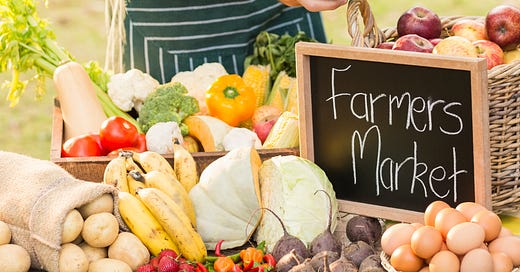Over the last few years, Saturday morning has become one of my favorite times of the week due to my wife and I switching to shopping for groceries at the local farmer’s market. We did this while we were out in Austin (Mueller Farmer’s Market if you’re wondering) and we have continued the trend since returning to the Tampa Bay area (St. Pete Saturday Morning Market).
The farmer’s market is a blast. We get to shop for groceries outside, sip on delicious craft coffee, talk to local farmers and food producers, and source some of the healthiest foods our area provides.
My friend Brian Sanders, the creator of the Food Lies brand, Eat Nose to Tail, and the Peak Human Podcast calls this the fresh, local, and seasonal approach.
When we source our foods locally, we ensure that the food is fresh. Locally sourced food doesn’t require long transportation to get to us meaning that we are consuming it closer to the time it was harvested. For most foods, especially fruits and vegetables, this means more micronutrients. An added value of this is that the foods have not been exposed to harmful chemical inputs to enhance their preservation so they can withstand the transportation. Simply speaking, you are getting a much more natural food when it is sourced locally.
The seasonal part is important too. When we source food locally, we are subject to seasonal availability which means that we get more diversity in our diet, which our gut likes, and we prevent ourselves from overeating higher sugar foods like fruit year-round.
Healthier food is a great reason to opt for locally sourced food, but the benefits of shopping locally are actually much broader.
Locally sourced food, especially from a farmer’s market, is also typically better for the environment.
One of my favorite parts about going to the farmer’s market is getting to actually meet and talk to the vendors who are creating the food I eat. It’s a lot of fun to get to know these people and as you talk to them you realize that most of them have a desire to do good for their environment. Most are following regenerative animal agriculture models or more natural produce farming techniques without chemical inputs. Of course, this also means a healthier product but also a healthier environment. Regenerative animal agriculture is replenishing our soil and even sequestering emissions while natural produce farming is reducing the chemicals that damage our soil and leak into our waterways.
Shopping locally is also a step toward better animal treatment. Talk to any local animal farmer about their animals and you will hear the passion in their voice. There is a strong desire to allow these animals to live how they should live, in conditions they should be living in, and even be put to death more humanly. Also, the lack of chemical inputs typically used by these farmers means less incidental animal death which is very prevalent with big produce farming operations.
Finally, sourcing food locally is also beneficial to the local economy. When you support your local farmers you are paying into a community that will be investing back into the local economy, which is the way that an ideal food system should operate.
If you are fortunate enough to have a local farmer’s market close by, check it out. You may also likely find that it is cheaper than those chemically ridden, nutrient-deficient storebought foods.
Thanks for reading,
Chris Irvin




